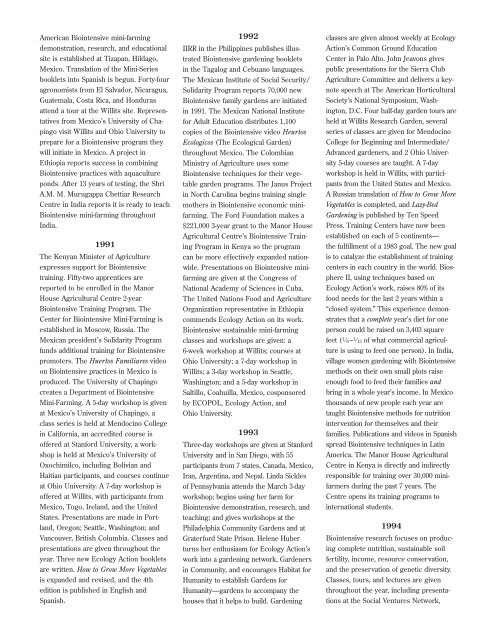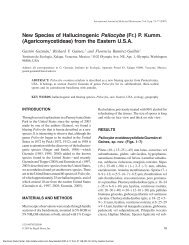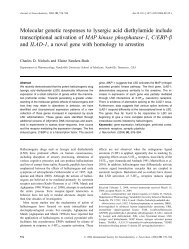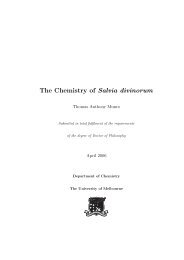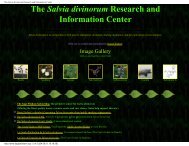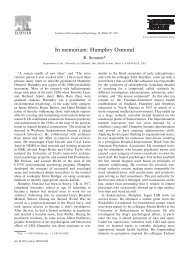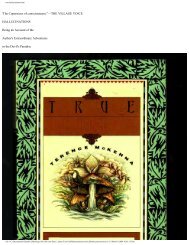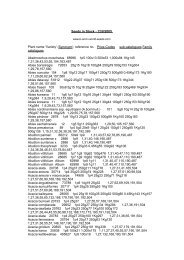How to Grow More Vegetables : And Fruits, Nuts ... - Shroomery
How to Grow More Vegetables : And Fruits, Nuts ... - Shroomery
How to Grow More Vegetables : And Fruits, Nuts ... - Shroomery
You also want an ePaper? Increase the reach of your titles
YUMPU automatically turns print PDFs into web optimized ePapers that Google loves.
American Biointensive mini-farming<br />
demonstration, research, and educational<br />
site is established at Tizapan, Hildago,<br />
Mexico. Translation of the Mini-Series<br />
booklets in<strong>to</strong> Spanish is begun. Forty-four<br />
agronomists from El Salvador, Nicaragua,<br />
Guatemala, Costa Rica, and Honduras<br />
attend a <strong>to</strong>ur at the Willits site. Representatives<br />
from Mexico’s University of Chapingo<br />
visit Willits and Ohio University <strong>to</strong><br />
prepare for a Biointensive program they<br />
will initiate in Mexico. A project in<br />
Ethiopia reports success in combining<br />
Biointensive practices with aquaculture<br />
ponds. After 13 years of testing, the Shri<br />
A.M. M. Murugappa Chettiar Research<br />
Centre in India reports it is ready <strong>to</strong> teach<br />
Biointensive mini-farming throughout<br />
India.<br />
1991<br />
The Kenyan Minister of Agriculture<br />
expresses support for Biointensive<br />
training. Fifty-two apprentices are<br />
reported <strong>to</strong> be enrolled in the Manor<br />
House Agricultural Centre 2-year<br />
Biointensive Training Program. The<br />
Center for Biointensive Mini-Farming is<br />
established in Moscow, Russia. The<br />
Mexican president’s Solidarity Program<br />
funds additional training for Biointensive<br />
promoters. The Huer<strong>to</strong>s Familiares video<br />
on Biointensive practices in Mexico is<br />
produced. The University of Chapingo<br />
creates a Department of Biointensive<br />
Mini-Farming. A 5-day workshop is given<br />
at Mexico’s University of Chapingo, a<br />
class series is held at Mendocino College<br />
in California, an accredited course is<br />
offered at Stanford University, a workshop<br />
is held at Mexico’s University of<br />
Oxochimilco, including Bolivian and<br />
Haitian participants, and courses continue<br />
at Ohio University. A 7-day workshop is<br />
offered at Willits, with participants from<br />
Mexico, Togo, Ireland, and the United<br />
States. Presentations are made in Portland,<br />
Oregon; Seattle, Washing<strong>to</strong>n; and<br />
Vancouver, British Columbia. Classes and<br />
presentations are given throughout the<br />
year. Three new Ecology Action booklets<br />
are written. <strong>How</strong> <strong>to</strong> <strong>Grow</strong> <strong>More</strong> <strong>Vegetables</strong><br />
is expanded and revised, and the 4th<br />
edition is published in English and<br />
Spanish.<br />
1992<br />
IIRR in the Philippines publishes illustrated<br />
Biointensive gardening booklets<br />
in the Tagalog and Cebuano languages.<br />
The Mexican Institute of Social Security/<br />
Solidarity Program reports 70,000 new<br />
Biointensive family gardens are initiated<br />
in 1991. The Mexican National Institute<br />
for Adult Education distributes 1,100<br />
copies of the Biointensive video Heur<strong>to</strong>s<br />
Ecologicos (The Ecological Garden)<br />
throughout Mexico. The Colombian<br />
Ministry of Agriculture uses some<br />
Biointensive techniques for their vegetable<br />
garden programs. The Janus Project<br />
in North Carolina begins training single<br />
mothers in Biointensive economic minifarming.<br />
The Ford Foundation makes a<br />
$221,000 3-year grant <strong>to</strong> the Manor House<br />
Agricultural Centre’s Biointensive Training<br />
Program in Kenya so the program<br />
can be more effectively expanded nationwide.<br />
Presentations on Biointensive minifarming<br />
are given at the Congress of<br />
National Academy of Sciences in Cuba.<br />
The United Nations Food and Agriculture<br />
Organization representative in Ethiopia<br />
commends Ecology Action on its work.<br />
Biointensive sustainable mini-farming<br />
classes and workshops are given: a<br />
6-week workshop at Willits; courses at<br />
Ohio University; a 7-day workshop in<br />
Willits; a 3-day workshop in Seattle,<br />
Washing<strong>to</strong>n; and a 5-day workshop in<br />
Saltillo, Coahuilla, Mexico, cosponsored<br />
by ECOPOL, Ecology Action, and<br />
Ohio University.<br />
1993<br />
Three-day workshops are given at Stanford<br />
University and in San Diego, with 55<br />
participants from 7 states, Canada, Mexico,<br />
Iran, Argentina, and Nepal. Linda Sickles<br />
of Pennsylvania attends the March 3-day<br />
workshop; begins using her farm for<br />
Biointensive demonstration, research, and<br />
teaching; and gives workshops at the<br />
Philadelphia Community Gardens and at<br />
Graterford State Prison. Helene Huber<br />
turns her enthusiasm for Ecology Action’s<br />
work in<strong>to</strong> a gardening network, Gardeners<br />
in Community, and encourages Habitat for<br />
Humanity <strong>to</strong> establish Gardens for<br />
Humanity—gardens <strong>to</strong> accompany the<br />
houses that it helps <strong>to</strong> build. Gardening<br />
classes are given almost weekly at Ecology<br />
Action’s Common Ground Education<br />
Center in Palo Al<strong>to</strong>. John Jeavons gives<br />
public presentations for the Sierra Club<br />
Agriculture Committee and delivers a keynote<br />
speech at The American Horticultural<br />
Society’s National Symposium, Washing<strong>to</strong>n,<br />
D.C. Four half-day garden <strong>to</strong>urs are<br />
held at Willits Research Garden, several<br />
series of classes are given for Mendocino<br />
College for Beginning and Intermediate/<br />
Advanced gardeners, and 2 Ohio University<br />
5-day courses are taught. A 7-day<br />
workshop is held in Willits, with participants<br />
from the United States and Mexico.<br />
A Russian translation of <strong>How</strong> <strong>to</strong> <strong>Grow</strong> <strong>More</strong><br />
<strong>Vegetables</strong> is completed, and Lazy-Bed<br />
Gardening is published by Ten Speed<br />
Press. Training Centers have now been<br />
established on each of 5 continents—<br />
the fulfillment of a 1983 goal. The new goal<br />
is <strong>to</strong> catalyze the establishment of training<br />
centers in each country in the world. Biosphere<br />
II, using techniques based on<br />
Ecology Action’s work, raises 80% of its<br />
food needs for the last 2 years within a<br />
“closed system.” This experience demonstrates<br />
that a complete year’s diet for one<br />
person could be raised on 3,403 square<br />
feet ( 1 ⁄ 6– 1 ⁄ 13 of what commercial agriculture<br />
is using <strong>to</strong> feed one person). In India,<br />
village women gardening with Biointensive<br />
methods on their own small plots raise<br />
enough food <strong>to</strong> feed their families and<br />
bring in a whole year’s income. In Mexico<br />
thousands of new people each year are<br />
taught Biointensive methods for nutrition<br />
intervention for themselves and their<br />
families. Publications and videos in Spanish<br />
spread Biointensive techniques in Latin<br />
America. The Manor House Agricultural<br />
Centre in Kenya is directly and indirectly<br />
responsible for training over 30,000 minifarmers<br />
during the past 7 years. The<br />
Centre opens its training programs <strong>to</strong><br />
international students.<br />
1994<br />
Biointensive research focuses on producing<br />
complete nutrition, sustainable soil<br />
fertility, income, resource conservation,<br />
and the preservation of genetic diversity.<br />
Classes, <strong>to</strong>urs, and lectures are given<br />
throughout the year, including presentations<br />
at the Social Ventures Network,


